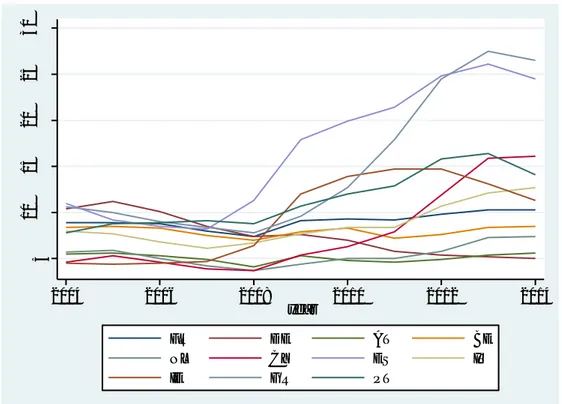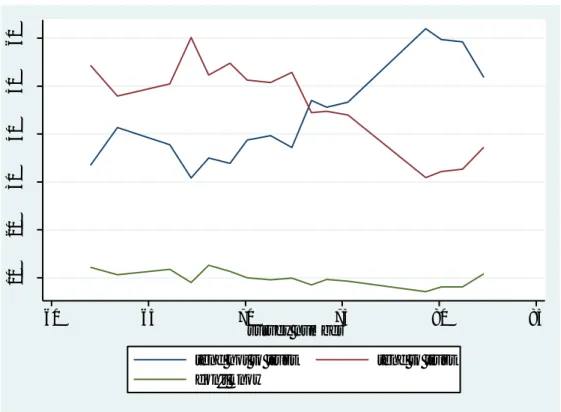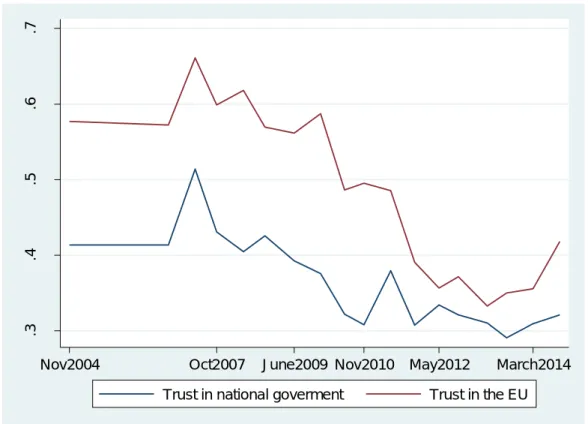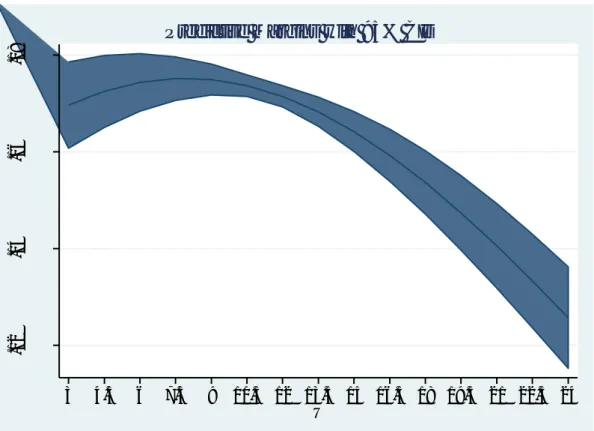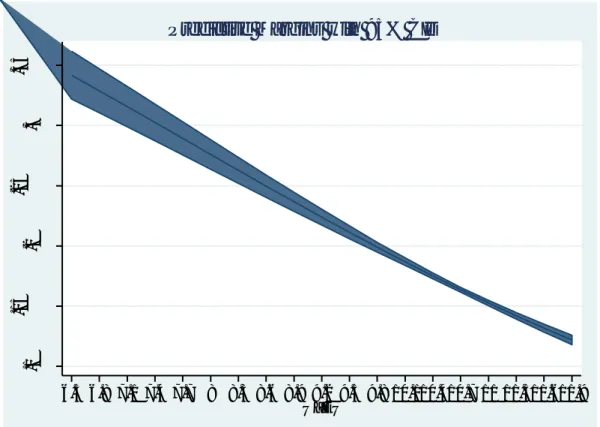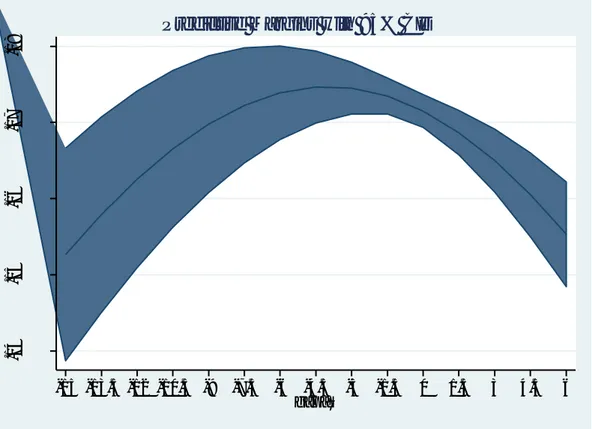HAL Id: halshs-01222511
https://halshs.archives-ouvertes.fr/halshs-01222511
Submitted on 30 Oct 2015
HAL is a multi-disciplinary open access
archive for the deposit and dissemination of
sci-entific research documents, whether they are
pub-lished or not. The documents may come from
teaching and research institutions in France or
abroad, or from public or private research centers.
L’archive ouverte pluridisciplinaire HAL, est
destinée au dépôt et à la diffusion de documents
scientifiques de niveau recherche, publiés ou non,
émanant des établissements d’enseignement et de
recherche français ou étrangers, des laboratoires
publics ou privés.
Public support for the economic governance of the euro
zone: empirical evidence from the debt crisis
Kristel Jacquier
To cite this version:
Kristel Jacquier. Public support for the economic governance of the euro zone: empirical evidence
from the debt crisis. 2015. �halshs-01222511�
Documents de Travail du
Centre d’Economie de la Sorbonne
Public support for the economic governance of the euro
zone: empirical evidence from the debt crisis
Kristel J
ACQUIER
1
PUBLIC SUPPORT FOR THE ECONOMIC GOVERNANCE OF THE EURO
ZONE: EMPIRICAL EVIDENCE FROM THE DEBT CRISIS
Kristel JACQUIER
1September, 2015
ABSTRACT:
Using a unique database combining Eurobarometer surveys from 2004 to 2014 trust is used as a proxy
for the value people give to the EU response to the crisis. The focus is on the euro zone and the
sovereign debt crisis which started in November 2009. Our empirical analysis supports the theory that
citizens blame the EU for the poor macroeconomic performances in the euro area. We rely on a
bivariate probit model to document the relationship between national government trust and EU trust.
We find that domestic macroeconomic conditions influence both level of government. However, a
deeper analysis suggests that the proximity with the average Euro zone economic performances
increases trust in the European Union.
JEL classification: F55, C25, F34
Keywords: European integration, survey research, debt crisis
1
Paris School of Economics, University of Paris I (Panthéon Sorbonne), Paris, France. email:
INTRODUCTION
Trust in the European Union has significantly declined during the Great Recession. This leads one to
believe that citizens consider the European Union as a relevant level of governance when crisis occurs.
As previously mentioned in the literature (Hobolt & Tilley, 2014), since citizens do not identify a
'European government', when they blame the EU for poor performance, they might lose trust in the EU
as a whole. Therefore, trust is used as a proxy for the value people give to the EU response to the crisis.
The focus is on the euro zone and the sovereign debt crisis which started in November 2009. Trust has
been declining during the great recession but in the euro zone, trust in the EU started to drop in 2010
while trust in the government had already began falling one year before. In the following paper we
shall use the hypothesis that trust in the EU was influenced by the economic governance during the
crisis. Indeed European institutions and a "European government" were on the spotlight and for the
first time made decisions with critical consequences in domestic policies.
The empirical evidence provided in the paper suggests that citizens blame European institutions for
the poor macroeconomic performances in the area. Unemployment has a strong and robust negative
influence on trust in the EU while long term interest rates are more volatile. As a second step we intend
to prove that a considerable proportion of EU citizens are now able to make an informed opinion on
EU politics and EU trust is not a proxy for evaluations of national politics and policy. Bivariate probit
estimates show that macroeconomic conditions might have a different impact on trust in the European
Union compared to trust in national governments. Predictive margins derived from the bivariate probit
model suggest that citizens living in countries with economic performances close to the Euro zone
average are more likely to trust the European Union.
LITERATURE
We build on a large body of work that has studied public support for the EU. At the micro level, EU
support has been constantly related to favorable position in the labour market and more generally in
the society. Studies focusing on people’s position in the labour market to explain support for the EU
find a strong and robust effect (Gabel and Whitten, 1997; Gabel, 1998) which is consistent with the
hypothesis that gains and losses from the EU are unevenly distributed. Inglehart & Rabier (1978) are
the first authors who introduced macroeconomic variables as determinants of public support for
European integration. They showed that growth and inflation matter but long-term influences such as
the length of membership or the cognitive mobilization are stronger predictors of attitudes towards
3
the EU. The link between citizens’ support towards the EU and economic conditions has been further
developed in the 1990’s. Anderson and Kaltenthaler (1996) confirm the impact of growth and inflation
but unemployment had the strongest impact on the period considered (1973-93). Eichenberg and
Dalton (1993) find a significant impact of inflation and intra-EC trade. Anderson and Reichert (1995)
evaluate direct (EU budget) and indirect (from trade) benefits at the country and individual levels. They
find EU budget is the strongest determinant of EU support for the 12 countries included in the study.
During that period scholars agreed that macroeconomic conditions had an influence although its
significance and magnitude would markedly vary depending on the sample and the time-period
considered. Since the early 1990s and especially after the ratification of the Maastricht treaty, the
literature has shown that macroeconomic conditions have become less significant (Eichenberg and
Dalton, 2007).
In fact, it is argued that once the benefits of greater intra-European trade flows and
more stable prices are regarded as acquired, European citizens have started considering the
redistributive implications of the convergence criteria on national policies, particularly on the different
national welfare state models.
In the context of the current sovereign debt crisis, several scholars advance the hypothesis that
macroeconomic variables could regain influence on citizens’ evaluation. Not only has the EU acquired
more competencies over years and citizens may hold it accountable for economic outcomes (Hobolt &
Tilley 2014) but the context of the crisis gives an opportunity for citizens to evaluate the European
governance based on decisions with a domestic impact. Kuhn and Stoeckel (2014) support the idea
that citizens consider the EU as a relevant actor to tackle the sovereign debt crisis. The European Union
is no longer evaluated through the benefits of membership but rather on the implications of the
economic governance. During the crisis, institutions in the Euro area (mainly the European Council)
have had to take measures that might disadvantage the typical ‘winners of European integration’ in
certain countries (Kuhn & Stoeckel, 2014). Gomez (2014) uses the Eurobarometer database from
September 2007 to May 2011 and brings evidence that European citizens blame the EU for the bad
economic situation in their home country. They find robust results for unemployment and interest
rates suggesting that there might be a feeling that the EU has failed to solve the sovereign debt crisis.
Gomez (2014) further analyses the preferences of younger Europeans (aged 30 or less in the study)
and finds that the effects of economic growth and interest rates are significantly stronger for this
segment of the population. Roth et al. (2014) seek to measure the impact unemployment on trust in
the European Central Bank. They use fixed effects Feasible Generalized Least Square (FGLS) on panel
date over the period 1999-2012. To do so, they calculate "net trust" by subtracting the percentage of
those who trust from those who do not trust. They separate pre-crisis from post-crisis periods and also
differentiate between core (Austria, Belgium, Finland, France, Germany, Italy, Luxembourg and the
Netherlands) and peripheral countries (Greece, Ireland, Portugal and Spain). They find a robust
negative relationship between unemployment and trust in the European Central Bank in times of crisis
especially in periphery countries. Serricchio et al. (2013) study the effect of growth, inflation and
unemployment on Euroscepticism using a logistic regression model. They compare data from 2007
and 2010 in order to capture the impact of the current financial crisis. They find a negative impact of
GDP growth in 2007 that becomes insignificant in 2010. Inflation and unemployment have no impact
in their model. Armingeon and Ceka (2014) use 5 waves of Eurobarometer surveys over the period
2007-2011. They estimate a multilevel logistic regression including 27 EU countries. Their analysis is
framed in David Easton theory of institutional support. Affective (diffuse) support and utilitarian
(specific) support determine the overall preferences of citizens towards institutions. Diffuse support is
based on ideology and cultural attachment. Diffuse support is by definition less volatile than specific
support that might fluctuate with potential gains and losses that a voter perceives from a given policy
outcome. Armingeon and Ceka (2014) hypothesize that the great recession has affected both diffuse
and specific support for the European Union. To explain both forms of support they draw on cue
theory (Hooghe and Marks, 2005). Cue theory states that cognitive short-cuts, contextual factors and
elite cues help citizens form opinions about issues they have little knowledge about. Armingeon and
Ceka (2014) argue that citizens tend to use national context to evaluate the EU and it should be even
more the case during the great recession because when discontent is high it extends to any level of
government. On the other hand if economic and social conditions are good there are no reason to
distrust any government. Trust in national government and trust in the EU are correlated by 0.67 in
their sample
2and the regression analysis enhances that trust in the government is the strongest
determinant of EU trust. None of the macro-economic indicators included in the analysis are
significant suggesting that they do not affect trust in the period studied. Armingeon and Ceka (2014)
elaborate on a causal relationship between trust in national governments and trust in the EU showing
that national elections and domestic economic conditions affect trust in the European Union.
Anderson (1998) is one of the first papers dealing with the interplay between national and European
politics. The empirical study in the paper tends to prove that trust in the EU is a proxy for trust in
national governments. Sanchez-Cuenca (2000) and Munoz et al (2011) also show that national
institutions influence preference towards the European Union. Sanchez-Cuenca (2000) highlight that
distrust in national institutions have a positive influence on support for the European Union. Citizens in
countries where corruption is high are more inclined to transfer sovereignty to European institutions.
Munoz et al (2011) confirm that living in a country with low trust institutions increases trust in the
European Union. All these empirical contributions may as well support the idea that trust in the EU and
trust in national governments are influenced by the same factors but do not necessarily influence one
2
5
another. It would be wishful thinking to imagine that trust in different level of institutions could be
perfectly independent. In the context of European integration, where decision-making is heavily
intergovernmental it is even more unlikely for citizens to compartmentalize both level of governments.
The present paper provides empirical evidence describing the interplay between national and
European politics, especially how macroeconomic variables influence institutional trust at the national
and European level.
The literature so far has showed that macroeconomic variables are unstable predictors of EU support.
Furthermore, documenting the interaction between national and European levels of governance is
promising.
THE DATA
We use a unique database combining Eurobarometer surveys from 2004 to 2014 and macroeconomic
variables
3. The micro variables are demographic controls for age and gender as well as indicators for
occupation and education level. As for macro variable we consider 2 adverse macroeconomic shocks:
Unemployment and long-term interest rates. The macro variables are standardized (variable with mean
0 and standard deviation 1).
The analysis covers a 10-year period and includes notably returning confidence after 2012. The EU is
not binding in terms of macroeconomic policies, while the single currency is. In order to assess the role
of market pressure as well as growth and employment perspectives we limited the sample to the 15 EU
member states that had adopted the Euro when the crisis occurred: Austria, Germany, Belgium, Spain,
Finland, France, Ireland, Italy, Luxembourg, the Netherlands, Portugal, Greece, Slovenia, Cyprus and
Malta
4.
Most empirical analyses use the membership question from the Eurobarometer to evaluate public
support for the European Union (Gabel, 2009; Kuhn et al, 2014). The question is as follows:
"Generally speaking, do you think that (your country’s) membership in the European Community (Common Market) is a bad thing (1), neither good nor bad (2), or a good thing (3)?"
3
A detailed description is provided in the appendix
4 11 countries participated in the official launch of the euro on 1 January 1999 (Austria, Germany, Belgium, Spain,
Finland, France, Ireland, Italy, Luxembourg, the Netherlands and Portugal); Greece adopted the single currency in 2001, Slovenia in 2007, Cyprus and Malta in 2008.
This question offers a subjective evaluation of the overall benefits of the European Union which is an
essential dimension of support for the EU, and it is of course highly correlated to institutional trust.
Nevertheless, by using the "trust" question we aim to target another dimension of support for the EU:
the evaluation of the governance of the euro zone. Although it is clear that all the dimensions are
jumbled together when individuals respond to surveys, the governance of the euro zone is likely to
have affected institutional trust the most.
Our dependent variable is “Trust in the European Union”. Citizens were asked the following question:
“I would like to ask you a question about how much trust you have in certain institutions. For each of the following institutions, please tell me if you tend to trust it or tend not to trust it”.
Respondents are presented with several institutions, one of which being the European Union. Along
with “tend to trust” and “tend not to trust”, respondents can also use a third category of answer “don’t
know”. As can be seen in the appendix, the amount of don’t know answers are negligible, they are thus
treated as missing values when logistic regressions are computed.
EMPIRICAL STRATEGY
The empirical analysis seeks to explain trust in the European Union. The dependent variable
encompasses two choices: tend to trust and tend not to trust. Thus a logistic regression is estimated. It
can be expressed as:
With
,
the cumulative logistic distribution function. The parameter vector
,
is
estimated by maximum likelihood.
Logistic models are latent variable models,
,
the latent variable is defined as follow:
The baseline model includes the main socioeconomic characteristics and the essential controls:
7
Where
i characterizes individuals and
j represents countries. D is a vector of individual
socio-demographic characteristics (age and gender). O represents the occupation of individuals. S is a
continuous variable capturing a trend in surveys over time. C stands for country dummies which
accounts for any omitted country-specific influence and
is the error term. Country dummies control
for omitted variables and measurements errors. Therefore within country variation is exploited.
Secondly macroeconomic variables are included one by one and altogether:
Following Armingeon and Ceka (2014) we want to see if being under IMF conditionality affected EU
trust. A dummy variable for the intervention of the “Troika”
5is included. It takes the value 1 for Greece
in 2010, for Ireland and Portugal in 2011 and for Cyprus in 2012.
In the next step three sub-samples are created in order to disentangle the consequences of the crisis.
We identify the announcement by
Papandreou's government in early November 2009 as the start of
the public debt crisis in Europe
6. Consequently, the pre-crisis sample includes surveys from 2004 to
2009, the post crisis from 2010 to 2014, and the peak of the crisis pool surveys from 2010 to 2012.
In the second part of the analysis trust in the European Union and trust in national governments are
jointly considered. We make the assumption that there are unobserved variables that influence people
to both trust (or distrust) the EU and their government. Both opinions are determined by the same
variables so that the error terms of the equations below are correlated. Like the seemingly unrelated
regression model, bivariate probit models assume that the i.i.d. errors are correlated.
and
are vectors of unknown parameters. The subscript
denotes an individual observation.
and
are the error terms. They are assumed to be normally distributed
.
5
The alliance between the European Central Bank, the European Commission and the International Monetary Fund to monitor the bailout plans in the Euro zone during the debt crisis
6
previous data on government debt levels and deficits had been misreported : in November 2009 Greece runs a year deficit of 12.7% of GDP, and a public debt of $410 billion
